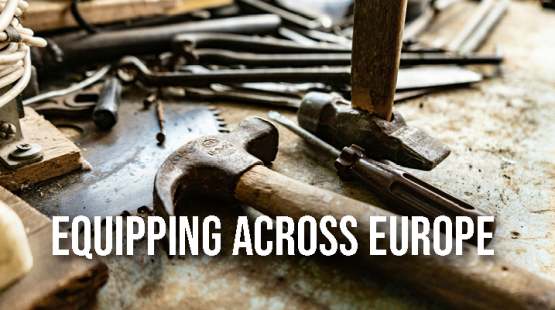Equipping Across Europe

We asked some of our field workers to share how they are equipping those around them.

Equipping God’s People: A Journey We’re Honoured to Share
Andrew & Kate Bulgaria
As our ministry focus with ECM has evolved over the last ten years, we have generally found ourselves walking alongside others. God has made clear to us that our calling is not just to do mission, but to equip others for it. Over the years, that word has come to life in countless ways—and today, it shapes every part of what we do.
For a time, we worked in partnership with Navigators, and they introduced us to the term ‘Mobile Alongsider’, which captures well the essence of the roles we have within ECM. Through both Zoom and face to face visits, we can provide support, encouragement and counsel.
The pivotal role in ECM’s field ministry structure is the Cluster Leader. These leaders walk alongside field workers in their cluster, providing ministry guidance, accountability, helping them connect into networks, empowering & developing them, and ensuring there is good member care. Essentially, as mobile alongsiders themselves, they are equipping the workers in their cluster.
In her Field Ministries Director role, one of Kate’s responsibilities is to ensure that this equipping is also happening for the Cluster Leaders, and she works with a small team (including Andrew) to facilitate this. Our travel often involves visits to Cluster Leaders, such as our trip to Portugal, Spain and Ireland back in January, where we did a number of Personal Development Conversations with leaders there. This face to face time is so valuable.
At its core, equipping is about seeing what God is doing in a person’s life and joining him there—calling out gifts, nurturing growth, and cheering people on as they step into God’s bigger story. We count it a privilege to be part of that process every single day.

Equipping University Students with God’s Word
Samuel & Emily Portugal
The University Bible Group (GBU) with which we work in Portugal, catches people in a very formative stage of their lives. For those who are not followers of Jesus, it is a time where they are often open to exploring faith as an adult, and for those who are followers of Jesus, it is a time where they are able to be matured in their Christian faith and witness as they receive Bible teaching and training through GBU activities.
One of these key GBU activities is weekly Bible study groups in faculty groups. In Coimbra, the city in which we work, several leaders of the GBU Bible studies expressed a lack of confidence in how to lead it, and how to read the Bible with others. In response to this, last year, we ran a Bible study leaders training course over 5 x 2 hour sessions during the semester aimed at equipping students with tools to be able to read the Bible well, and be able to lead others in it.
Some key focuses of the training included helping students understand the historical and literary context of a Bible passage, how a Bible passage fits within God’s big story of salvation centred around Jesus, and how to make Bible studies welcoming and inviting to non-Christians. These were new concepts to many of the students.
The take-up of the training was more than we had anticipated, with 15 students (half of the GBU Coimbra group) taking part, most attending with eagerness to learn and apply what they had been learning.
These are now 15 students who are now better equipped to handle God’s word and love those they lead, not only in the context of GBU Bible studies, but more significantly, in their respective churches across Portugal and beyond, now and for their lifetime.
Equipping Children’s Ministry Workers
Adi & Jennifer Romania
My husband Adi and I serve in Timisoara, Romania and whilst Romania is considered a very religious nation, with over 90% of the population of 20 million classifying themselves as Christian, to many this may mean little more than a cultural identity or simply attending a church, rather than an active relationship with the living Jesus Christ.
From our personal experience over many years, we saw many Protestant Christians were keen to have children as a part of their church but many lacked the training and resources needed to effectively reach children in their communities with the gospel. We also saw that in many places children were only taught a moral gospel of being ‘good boys and girls’. We were struck with the need to encourage and equip local Christians to teach children the true gospel of grace, how to become followers of the Lord Jesus and to grow in their faith.
It is our aim to encourage and equip local Christians to share the gospel of Jesus with the children of Romania, so that all children through every part of Romania get to hear and respond to Jesus. Whilst we are based in the city of Timisoara, through our partnership with AMEC (Child Evangelism Fellowship) our ministry extends to other parts of Romania, even to Romanians living throughout Europe via online training. Most recently we were encouraged to be able to assist in three local AMEC conferences, over three Saturdays in three different counties. The theme was ‘Beyond Words’, challenging and equipping children’s workers to find ways to teach Biblical truths in engaging and interactive ways. Our prayer is that those who attended were encouraged and equipped to use new and creative methods to teach the Scriptures to the children in their churches and communities.

First Culture Workers Equipping Their Church Community
Georg & Sandra Austria
Every summer (July in Austria) we run a kids camp which is a big highlight of the year. Our main goal is to share God’s love with the kids in a variety of ways. But it’s not just about the kids who come along to camp. It’s a great way to equip believers to lead others closer to Jesus.
Prior to camp, we sit down with each leader to look over our goals and vision. This sets and clarifies expectations and gives me (Georg) the chance to talk with them about their faith journey which gives me an insight into where they are currently at spiritually.
We also hold planning and training sessions to get ready for the program. We use this time to ensure that the leaders are well equipped for the task of leading.. We remind the team of the vision and the primary goal of sharing the hope of Christ Jesus. We aim to use this time to create unity within the team and create a sense of togetherness in God’s mission.
During camp, it takes a whole team to execute the planned program. There are whole group teaching times and small groups, and activities which include craft and games. Camp is such a unique environment of intense focus on running a program where kids and leaders spend a lot of time together. We see leaders grow personally and spiritually as they rise to the challenges of running such a camp. These challenges include possible extreme weather conditions, tiredness amongst both leaders and kids towards the second half of camp, pressure on team relationships and managing a range of camper behaviours.
Once camp is over and everyone has recovered, the leadership team comes back together 2 months later in September to reflect and debrief. Over these 2 days, we celebrate and reflect as we give thanks to God for what he has accomplished in and through the team. We count it a privilege to be equipping our fellow Austrians to share the hope of Christ Jesus.
![]()
AS YOU PRAY
-
Give thanks for the opportunities God is providing for the ongoing equipping of the church.
-
Pray for wisdom and grace as workers in the field seek to come alongside others for the sake of the Gospel.
This article appears in ECM News Winter 2025
Archive
January 2026
September 2025
May
February
January
November 2024
August
- 06 - August - 2024 - You Can't Wake Someone Pretending to Be Asleep
- 05 - August - 2024 - ECM News Mailout Day


 At ECM, our work is more than programmes and projects—it’s about people, and ultimately, it’s about God, at work in and through us. Every time a believer is equipped, a community is connected, or a disciple is multiplied, it is His Spirit moving, using us as instruments for His glory.
At ECM, our work is more than programmes and projects—it’s about people, and ultimately, it’s about God, at work in and through us. Every time a believer is equipped, a community is connected, or a disciple is multiplied, it is His Spirit moving, using us as instruments for His glory.  We asked some of our workers to share how they are connecting with those around them in Jesus name.
We asked some of our workers to share how they are connecting with those around them in Jesus name.